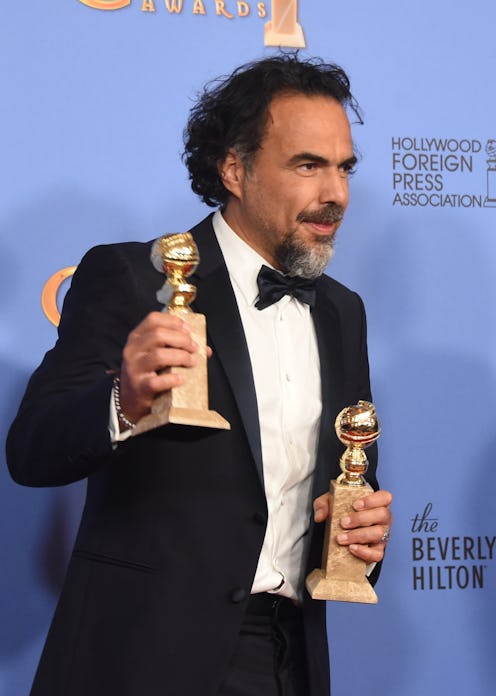Entertainment
Alejandro G. Iñárritu May Break This Oscar Record
Though some of the biggest names in film history, from Elia Kazan to Steven Spielberg, have received consecutive Oscar nominations for Best Director, just two directors have pulled off a coup and actually won the award for two straight awards ceremonies. (Two consecutive years is the longest run; no director has managed to nab it three times, though Frank Lloyd was nominated for three separate films during the 1928-1929 ceremony: Weary River, Drag, and The Divine Lady, which eventually won.) So on the heels of Sunday night's Golden Globe for Best Director, Alejandro G. Iñárritu could break Oscar records and make cinematic history as just the third man in Oscar history to win two consecutive Best Director awards.
Joseph L. Mankiewicz won the award in 1949 and 1950 for A Letter to Three Wives and All About Eve, respectively. Mankiewicz also made a name as the only director to consecutively win both Best Director and Best Screenplay. Prior to Mankiewicz, John Ford won in 1939 and 1940 for The Grapes of Wrath and How Green Was My Valley. A win for Iñárritu would be the first time that this feat has been pulled off in more than 60 years, and the first time ever for a director of Mexican descent.
Yet Iñárritu's Golden Globes win doesn't necessarily make him the frontrunner for the Best Director Oscar. The Golden Globes and Oscars have a somewhat embattled history, where the winner of the former often doesn't go on to win the latter. Alfonso Cuarón won both with Gravity in 2013, but from 2010 to 2014 the Golden Globe winner failed to receive the Oscar. In 2012, Ben Affleck, who won the Golden Globe for direction for Argo, wasn't even Oscar-nominated. Last year, Richard Linklater won Best Director for Boyhood but Iñárritu's previous effort Birdman pulled ahead in the Oscar race, winning both Best Director and Best Picture. In the early 2000s, directors like Ang Lee, Clint Eastwood, and Peter Jackson won both awards, but never in consecutive years despite how prolific all three directors were during this period.
The Academy of Motion Picture Arts and Sciences is also notorious for its history of refusing consecutive awards to artists behind and in front of the camera. Katharine Hepburn was the last actress to win Best Actress in consecutive years, for Guess Who's Coming to Dinner and The Lion in Winter; Tom Hanks was the last actor to win Best Actor twice in a row for Philadelphia and Forrest Gump. No actress has ever won two consecutive Best Supporting Actress awards (though actress like Cate Blanchett have recently been nominated in consecutive years for the award) and just one actor, Jason Robards, has ever won Best Supporting Actor two straight years. David O. Selznick was the first and only producer to win Best Picture. The range of directors the Academy will consider for awards has broadened considerably since the first Oscar ceremony, giving voters less and less reason to honor the same director two years in a row.
Iñárritu's Revenant is certainly an ambitious directorial project, but most critics did not consider him a frontrunner for Best Director, Drama in the lead-up to the Golden Globes. Tom McCarthy's Spotlight and Todd Haynes' Carol were deemed more likely competitors for both Best Director and Best Picture. Given past Oscar trends, losing the Golden Globes to The Revenant may not prove a huge setback for either movie — and Iñárritu must still compete against these favorites when the Academy Awards arrive, perhaps even more so for his recent Birdman win.
Images: 20th Century Fox (2)
